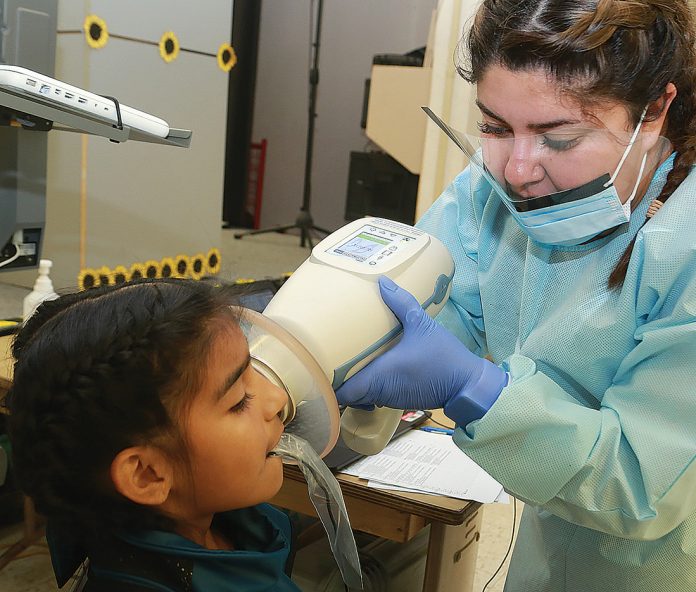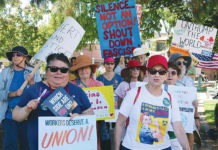
SACRAMENTO—Gov. Gavin Newsom on April 22 announced plans to allow hospitals to resume surgeries and other procedures that were delayed while the state grapples with the novel coronavirus pandemic.
These procedures include heart valve replacements, angioplasty and tumor removals, and key preventive care services, such as colonoscopies, all of which were deferred as the state’s healthcare providers prepared for a surge of COVID-19 patients.
On Thursday, Santa Cruz County Health Officer Gail Newel issued an order allowing dental and medical offices to reopen, after being closed since her shelter-in-place order.
Those were deemed non-essential under the previous rules.
The brief closure was rough for Dientes Community Dental Care and other providers, Chief Dental Officer Sepi Taghvaei said.
Dientes sees about 11,000 patients per year at its three locations, one clinic in Watsonville and two in Santa Cruz. It also provides outreach programs at schools, nursing homes and low-income housing developments.
Taghvaei said the clinic was offering only emergency dental services under the previous orders, and was losing about $200,000 in revenue every week due to the decreased visits.
In addition, the organization has tapped into its reserves for about $700,000 to be able to provide emergency services. That is important, she said, because emergency rooms are not equipped to help with serious dental problems.
“This is a large investment, but I feel that it’s our duty to be there for our community during this pandemic and care for their dental emergencies, because otherwise they will have nowhere else to go,” she said.
Dientes furloughed all of its employees, Taghvaei said, with some out of work entirely and others reduced to about two days per week. Some employees have taken a 15 percent pay cut.
Still, the organization is paying 100 percent of employee health insurance benefits, and that of their dependents, Taghvaei said.
“We felt that having health insurance is paramount at this time and this was a great way to support our staff during this time,” Taghvaei said.
Brian Del Core is a dentist with a private practice in Aptos. He also works for Dientes Community Dental Care, and sits on the board of that organization.
When local and state officials began signaling plans to shutter all but essential businesses Del Core said he told his employees he would finish out that pay period, and then to apply for unemployment.
Del Core said he understands and agrees with the reason behind the temporary closure of his industry. He explained that dental visits put the practitioners, hygienists and patients at an especially high risk for contracting airborne diseases such as COVID-19.
“We’re dealing with a patient’s oral fluids, and their respiratory system,” he said. “When patients are breathing and we have aerosols that we create with our procedures, there are droplets that are suspended in the air and we are exposed to that.”
Del Core said that patients will likely have a drastically different experience when clinics reopen for appointments.
Dental workers will likely be required to use much higher levels of Personal Protective Equipment, he said, along with higher filtration masks, face shields and hospital-type gowns.
Clinics will also likely leave more time in between appointments to allow for cleaning, which Del Core said could reduce productivity and cause further financial damage.
Patients, meanwhile, will likely be screened before most procedures to make sure they don’t have COVID-19 symptoms such as fever and cough.
“I’ve never experienced anything like this,” Del Core said. “I’ve been doing dentistry for 34 years as a private practitioner, and this is the first time we’ve had to be restricted on seeing patients. We’ve been told we have to stop practicing, and that’s very unusual and unique and that’s going to create a lot of hardship for a lot of people.”
A transition to stricter standards could be an easy one for dentists, who already work under a framework of stringent procedures in place, Taghvaei said.
“Dental facilities and personnel are experts in infection control, and dental care is time-sensitive as often conditions worsen over time,” she said. “That’s why when the Health Department considers it safe for us to return, we will have a plan in place to prioritize safety of our staff and patients but also to return to providing much-needed dental care.”
Still, it is unclear how any such requirements will be enforced, since that takes cost and personnel, Del Core said.
“In this economic environment, it’s going to be very hard to police that,” he said. “I think the diligent practitioners and offices and clinics will follow protocol, but I think there is going to be a potential for shortcuts because it costs a lot more to follow it.”
Del Core said it’s too soon to predict when he can start rehiring employees. But he predicts that it will be a rough transition.
“I think the workforce is going to be at least diminished by 50 percent for I would guess the first three to six months,” Del Core said. “And it may be longer.”
According to Taghvaei, dental facilities were not included in the original list of essential services because they lacked the necessary amount of PPE. That profession sees more patients than other surgical fields, and must change them after every patient, she said.
“As a part of our planning, we have been looking at all available sources and trying to secure PPEs,” she said. “Thankfully, dental supply companies are catching up with the demand and we should have enough PPEs by the time we resume normal operations.”
Medical offices are facing similar impacts, said Salud Para la Gente CEO Dori Rose Inda.
Salud, which offers primary and preventative care and checkups, has now limited its services and is now seeing pregnant women and children under 2. The clinic is also making sure that patients with chronic conditions have access to care, and providing medication and refills, Inda said.
“Other than that we are postponing the nonessential care,” Inda said. “COVID-19 has changed everything for everybody.”
At the same time, the crisis has forced the medical field toward a model in which patients see doctors via Telehealth, Inda said.
That service, which offers real-time, audio-video communication between physicians and patients, is currently being used by about 100 million people in the U.S. with chronic medical conditions, according to the American Medical Association.
“This has all been very hard and fast and very focused on flattening the curve, keeping people home, and able to really comply with the shelter-in-place and keeping people healthy at the same time,” she said.











